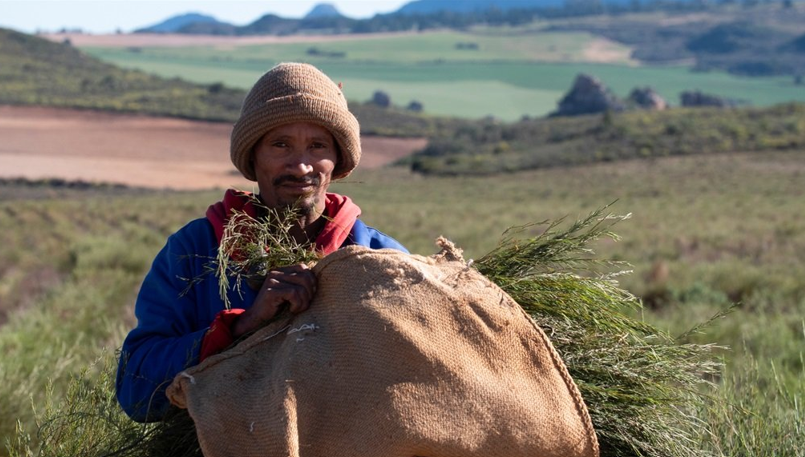South Africa’s rooibos industry just paid out R12.2 million to the Khoi and San communities
A rooibos tea farm worker with a bag of cut rooibos tea during the harvest.
- The Khoi and San communities will now benefit from the rooibos industry’s commercial use of rooibos and honeybush.
- The rooibos industry paid R12.2 million to the communities’ councils, making good on a share-benefit agreement signed in 2019.
- The South African government recognised the Khoi and San people as the rightful knowledge holders of rooibos.
- As part of the agreement, the rooibos industry pays a levy of 1.5% of the farm gate price of rooibos to a trust on an annual basis.
South Africa’s rooibos industry has just paid out as much as R12.2 million to the Khoi and San communities as part of a benefit-sharing agreement signed almost three years ago.
In 2019, the rooibos industry, the National Khoi and San Council, and the South African San Council signed an access and benefit-sharing (ABS) agreement, which will see the Khoi and San communities share in the profits of the rooibos industry, who benefit from their traditional knowledge of the tea and the commercial use of the plant.
The R12.2 million sum is the first tranche of the access and benefit-sharing fund, following years of negotiations stretching back to 2014 when the South African government recognised the Khoi and San as the rightful traditional knowledge holders of rooibos.
The South African Rooibos Council (SARC) said the agreement would see all volumes of rooibos sold levied through one process. It said a benefit-sharing levy of 1.5% of the farm gate price of rooibos would be paid out into a trust annually, estimated at R12 million a year.
The SARC said the funds were primarily intended for uplifting the Khoi and San communities, citing that their use will be independently decided by the National Khoi and San and South African San councils.
Martin Bergh, the chairperson of the SARC, said benefit-sharing funds aim to contribute to poverty reduction, food security, social development, and biodiversity conservation.
“As a signatory to the Nagoya Protocol, South Africa requires all who trade in indigenous biological resources, such as Rooibos, to share benefits with traditional knowledge holders in a fair and equitable way,” the SARC said in a statement on Tuesday.
The benefits of the agreement include job creation and support to about 160 small-scale farmers of the Wupperthal cooperative in the Western Cape and the Heiveld co-op in the Northern Cape, the Department of Forestry, Fisheries and the Environment said at the time the agreement was signed.
The landmark agreement and subsequent payment is a victory for the Khoi and San people, who have been demanding to be adequately acknowledged for their expertise on the rooibos and honeybush species.
Native to the Cape Floral Kingdom, rooibos is used in several products such as cosmetics, beverages, medicines, slimming agents, and juices, among others. The industry, which is also enjoying growing global demand, produces about 14,000 tons of rooibos annually and exports more than 6,000 tons. The sector creates enough rooibos to make about 5.6 billion cups of tea.

